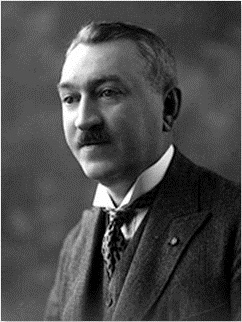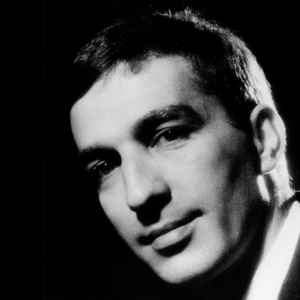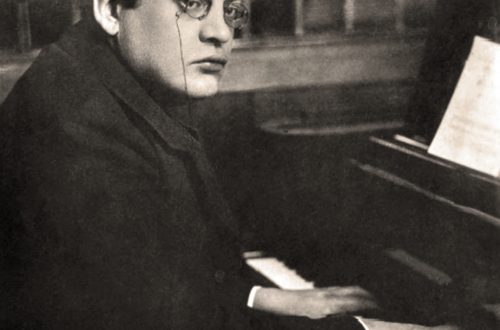
Nikolay Nikolaevich Cherepnin (Nikolai Tcherepnin) |
Nikolai Tcherepnin
There is a whole world, alive, diverse, Magic sounds and magic dreams… F. Tyutchev
On May 19, 1909, the entire musical Paris enthusiastically applauded the ballet “Pavilion of Armida”, which opened the first ballet “Russian Season”, organized by the talented propagandist of Russian art S. Diaghilev. The creators of the “Pavilion of Armida”, which for many decades gained a foothold on the ballet scenes of the world, were the famous choreographer M. Fokin, the artist A. Benois and the composer and conductor N. Cherepnin.
A student of N. Rimsky-Korsakov, a close friend of A. Glazunov and A. Lyadov, a member of the well-known community “World of Art”, a musician who received recognition from many of his outstanding contemporaries, including S. Rachmaninov, I. Stravinsky, S. Prokofiev, A. Pavlova, Z. Paliashvili, M. Balanchivadze, A. Spendnarov, S. Vasilenko, S. Koussevitzky, M. Ravel, G. Piernet. Sh. Monte and others, – Cherepnin entered in the history of Russian music of the XX century. one of the brilliant pages as a composer, conductor, pianist, teacher.
Cherepnin was born into the family of a well-known St. Petersburg physician, personal physician F. Dostoevsky. The Cherepnin family was distinguished by broad artistic interests: the composer’s father knew, for example, M. Mussorgsky and A. Serov. Tcherepnin graduated from St. Petersburg University (Faculty of Law) and the St. Petersburg Conservatory (composition class of N. Rimsky-Korsakov). Until 1921, he led an active creative life as a composer and conductor (“Russian Symphony Concertos”, concerts of the Russian Musical Society, summer concerts in Pavlovsk, “Historical Concerts” in Moscow; conductor of the Mariinsky Theater in St. Petersburg, Opera House in Tiflis, in 1909- 14 years conductor of the “Russian Seasons” in Paris, London, Monte Carlo, Rome, Berlin). Tcherepnin’s contribution to musical pedagogy is enormous. Being in 190518. teacher (since 1909 professor) of the St. Petersburg Conservatory, he founded the first conducting class in Russia. His students – S. Prokofiev, N. Malko, Yu. Shaporin, V. Dranishnikov and a number of other outstanding musicians – dedicated words of love and gratitude to him in their memoirs.
Tcherepnin’s services to the Georgian musical culture are also great (in 1918-21 he was the director of the Tiflis Conservatory, he acted as a symphony and opera conductor).
Since 1921, Cherepnin lived in Paris, founded the Russian Conservatory there, collaborated with the ballet theater of A. Pavlova, and toured as a conductor in many countries of the world. The creative path of N. Tcherepnin lasted more than half a century and was marked by the creation of over 60 opuses of musical compositions, editings and adaptations of works by other authors. In the creative heritage of the composer, represented by all musical genres, there are works in which the traditions of The Mighty Handful and P. Tchaikovsky are continued; but there are (and most of them) works that are adjacent to the new artistic trends of the XNUMXth century, most of all to impressionism. They are very original and are a new word for Russian music of that era.
Tcherepnin’s creative center consists of 16 ballets. The best of them – The Pavilion of Armida (1907), Narcissus and Echo (1911), The Mask of the Red Death (1915) – were created for the Russian Seasons. Indispensable for the art of the beginning of the century, the romantic theme of the discord between dreams and reality is realized in these ballets with characteristic techniques that bring Tcherepnin’s music closer to the painting of the French impressionists C. Monet, O. Renoir, A. Sisley, and from Russian artists with paintings by one of the most “musical” artists of that time V. Borisov-Musatov. Some of Tcherepnin’s works are written on the themes of Russian fairy tales (the symphonic poems “Marya Morevna”, “The Tale of the Princess Smile”, “The Enchanted Bird, the Golden Fish”).
Among orchestral works by Tcherepnin (2 symphonies, Symphonietta in memory of N. Rimsky-Korsakov, symphonic poem “Fate” (after E. Poe), Variations on the theme of a soldier’s song “Nightingale, nightingale, little bird”, Concerto for piano and orchestra, etc.) the most interesting are his programmatic works: the symphonic prelude “The Princess of Dreams” (after E. Rostand), the symphonic poem “Macbeth” (after W. Shakespeare), the symphonic picture “The Enchanted Kingdom” (to the tale of the Firebird), the dramatic fantasy “From edge to edge ”(according to the philosophical article of the same name by F. Tyutchev),“ The Tale of the Fisherman and the Fish ”(according to A. Pushkin).
Written abroad in the 30s. the operas The Matchmaker (based on A. Ostrovsky’s play Poverty Is Not a Vice) and Vanka the Key Keeper (based on the play of the same name by F. Sologub) are an interesting example of introducing complex techniques of musical writing into the genre of folk song opera traditional for Russian music XX in.
Cherepnin achieved a lot in the cantata-oratorio genre (“Song of Sappho” and a number of spiritual works a cappella, including “The Virgin’s Passage through Torment” to texts of folk spiritual poems, etc.) and in choral genres (“Night” on st. V. Yuryeva-Drentelna, “The Old Song” at the station of A. Koltsov, choirs at the station of poets of the People’s Will I. Palmina (“Do not cry over the corpses of the fallen fighters”) and I. Nikitin (“Time moves slowly”). Cherepnin’s vocal lyrics (more than 100 romances) cover a wide range of topics and plots – from philosophical lyrics (“Trumpet voice” on D. Merezhkovsky’s station, “Thoughts and Waves” on F. Tyutchev’s station) to pictures of nature (“Twilight” on by F. Tyutchev), from the refined stylization of Russian songs (“Wreath to Gorodetsky”) to fairy tales (“Fairy Tales” by K. Balmont).
Among other works by Cherepnin, one should mention his wonderful piano “ABC in Pictures” with drawings by A. Benois, String Quartet, quartets for four horns and other ensembles for various compositions. Cherepnin is also the author of orchestrations and editions of many works of Russian music (Melnik the Sorcerer, Deceiver and Matchmaker by M. Sokolovsky, Sorochinsky Fair by M. Mussorgsky, etc.).
For many decades, Tcherepnin’s name did not appear on theater and concert posters, and his works were not published. In this he shared the fate of many Russian artists who ended up abroad after the revolution. Now the composer’s work has finally taken its rightful place in the history of Russian musical culture; several symphonic scores and a book of his memoirs have been published, the Sonatina op. 61 for wind, percussion and xylophone, the masterpiece of N. Tcherepnin and M. Fokine, the ballet “Pavilion of Armida” is waiting for its revival.
ABOUT. Tompakova





